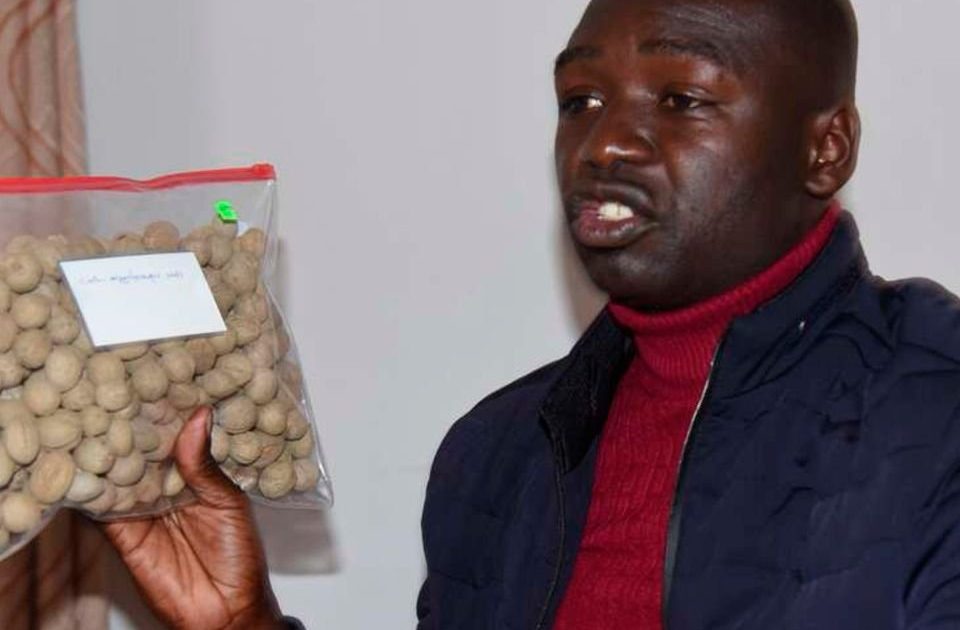Egerton University and University of Greenwich- UK have, teamed-up with a local enterprise to strengthen capacity for extraction of biofuels and various value-added products, from Croton megalocarpus nuts.
The 15 month project, funded by United Kingdom’s Government through its African Agriculture Knowledge Transfer Partnerships (AAKTP) scheme, is also focusing on improving productivity and efficiency during processing of the Croton megalocarpus tree products, in the manufacture of animal feed supplements, beauty products, organic fertilizers and biocides also known as ‘green pesticides’.
Croton megalocarpus grows naturally in various ecological zones — from the Coast to the highlands of central Kenya and the dry lands of the North Rift. It is called Msenefu in Kiswahili, Omkinduli in Luhya, Mukinduri in Gikuyu and Kelelwet in Kipsigis. In these regions, the annual rainfall ranges between 400mm and 1,400mm.
According to the project’s Principal Investigator, Professor Josiah Omollo, the partnership with the Nanyuki based EcoFix (Kenya) Limited, will focus on designing and developing plant-based natural product innovations using Croton seed oil and the by-products from its extraction for sustainable, organic agriculture in Kenya aimed at reducing farmer reliance on synthetic chemical pesticides and increasing household revenues.
He says over use of synthetic pesticides and inorganic fertilizers have been a matter of concern for both scientists and public in recent years as they caused soil degradation, environmental and health hazards, poor yields and deaths of livestock.
“Chemical analysis have established that Croton megalocarpus nuts can be an alternative good source of natural chemical pesticide and organic fertilizers due to their safe, eco-friendly and more compatibility with environmental components compared to synthetic pesticides and artificial fertilizers. They can be safely used to manage the pest and minimize the yield loss,” notes Professor Omollo.
The Associate Professor of Organic Chemistry, Department of Chemistry, Faculty of Science at Egerton University, indicates that the Croton megalocarpus nut’s value added products’ industry was currently undervalued yet its outcome when fully exploited could rival other foreign exchange earners and boost the livelihoods of the small holder Kenyan farmers.
Its scientific name comes from the Greek word ‘kroton’, which means tick. Its seeds resemble ticks.
Professor Omollo states that diversification into other products in Croton megalocarpus nut value chain was not only environmentally friendly but also made business sense as it had become clear that reliance on biofuels only would not sustain long-term business growth.
“The project is premised on conservation and climate change where we don’t want to waste anything from the nut’s production chain. If value addition is confined to producing biofuels the process would be very expensive and nearly 90 per cent of the nut would be wasted,” he adds
EcoFix (Kenya) that was started by Mr Cosmas Ochieng in 2012 now collects croton nuts from 6,000 farmers 85percent of whom are women and youths spread in 21 regions in Mt Kenya, Rift Valley and Eastern and uses them in the manufacture of biofuels, fertilizer and seed cake for animals and poultry.
Professor Omollo indicates that the volume of nuts the firm collects has increased from an initial 600 tons per year to 3,000 tons.
The company that currently employs over 50 workers buys the nuts at Sh12, 000 a ton.
The Principal Investigator reveals that the venture is also encouraging a business model where local farmers plant and harvest croton nuts to offer them reliable income. Through the trees, he notes farmers will be able to mitigate climate change effects as they address challenges like poverty.
“Croton megalocarpus is now being touted as a tree with a huge potential to reclaim eroded soils and restore them to productivity. Leaves from the croton megalocarpus trees’ have greatly improved the fertility and soil texture in the regions where they are grown while providing cover that helps in reducing evaporation during the rainy season. Croton husks can be used as a soil conditioner,” Professor Omollo explains.
He says mature crotons produce clusters of bright sweetly-scented flowers which attract bees making the tree crucial in honey production.
“It is an eco-friendly way of engaging in economic activities where the community invests in nature conservation then waits for the fruits that come with it,” he notes.
Professor Omollo indicates that the resultant croton husks after value addition, which are rich in nitrogen, can be used to make organic fertilizer.
He notes that leaves are also used as mulch because of their high nitrogen content, while the oil is used in machines and in tanneries to treat leather.
“More Kenyan farmers are adopting sustainable farming practices, which have seen the number of certified organic farmers in the country double to over 70,000 in three years. Thus, there is a big opportunity in the Croton Megalocarpus value chain to supply that certified growers market with a ready-to-use organic pesticides and fertilizers and help them get better yields while making a stronger case for more certified organic growing,” The Principal Investigator notes.
Farmers have planted more than a million croton trees around the country as close to a million others have been conserved through EcoFix network, according to its Chief Executive Officer Mr. Ochieng.
He explains that the firm produces pure biofuel from the nuts, which can be used as a direct substitute for diesel fuel in generators, in large fixed diesel engines and in steam boilers, but not in automobiles.
Fossil fuels — currently accounting for nearly a half of global energy consumption — are the major contributor to the deadly greenhouse gas emissions that have been linked to climate change.
The use of biofuels, says the Chief Executive Officer, will also enhance Kenya’s capacity to earn from the global carbon trade which rewards projects whose activities limit the emission of carbon dioxide into the environment.
Besides, Mr. Ochieng argues, bio-fuels have the potential of boosting economic growth in the countryside through jobs creation and skills development and that Kenya could significantly reduce the number of people visiting rural dispensaries and health centres by eliminating indoor pollution that is mainly caused by use of wood fuels.
“The advantages of using croton nut oil are numerous. The oil has self-lubricating properties that makes it better than diesel. It has a flash-point much higher than diesel, a density slightly lighter than diesel and an energy calorific value 10 per cent lower than diesel,”
He adds that it is environmentally-friendly, totally miscible with diesel and can be blended in any ratios.
“Compared to other fuels such as diesel, croton is cheaper and generates far less carbon dioxide emissions. It can also power water pumps and tractor engines,” says Ochieng who trained as a food scientist.
When the oil is extracted, what remains is used as animal feed. Croton seed has high oil (30 per cent) and protein (50 per cent) content.
The EcoFix Chief Executive notes that croton seedcake boasts of a highly concentrated source of protein with balanced levels of fat and fibre; that is 25 percent protein, 10 percent fat, 27 per cent crude fibre, 10 per cent moisture and 202 Energy (kcal/100g).
The protein content he says is 39 per cent higher than canola (18 percent protein) and 25 per cent higher than sunflower (20 per cent). Mr. Ochieng adds that unlike much of the seedcake produced from other ground nuts, which are highly susceptible to mold growth, croton seed cake ensures the safest quality feed for poultry.
“Our country is importing 30,000 tons of plant-based seedcakes, a market that takes jobs out of the hands of Kenyans. In Kenya’s increasing emphasis on locally-produced raw materials, croton seed cake has the potential to grow the private sector and encourage long-term national development,” he points out.
On the other hand the husks are taken through a carbonization process to get croton vinegar.
Ochieng’s firm sells the oil to corporates like Del Monte and Standard Chartered Bank, which use it to power their generators, but 80 per cent of the oil is sold to distributors, some who export it.
A ton of nuts produces 100 litres of oil. The firm produces 300,000 litres of biofuel annually from 3,000 tons of nuts they get from farmers at Sh10 a kilo.
Ochieng said out of the 300,000 litres of biofuel they produce, 80 per cent is used as fuel while 20 per cent goes to making cosmetics.
His latest innovation is the cosmetic brand called Nea by Nature, which uses croton oil as a base when making products like soap.
“In our research, we found croton nuts have unique physical elements, including high moisturizing properties,” says Ochieng.
By Anne Mwale and Charloth Chepkemoi




